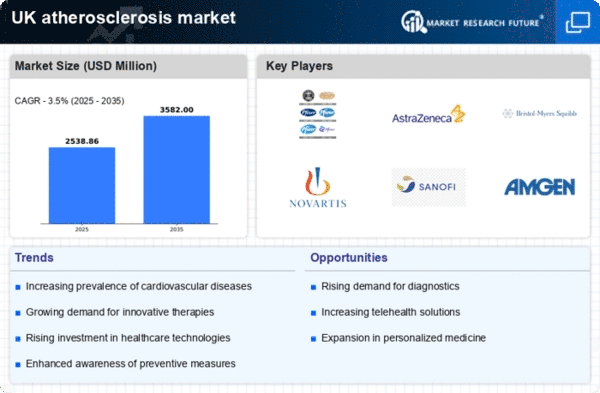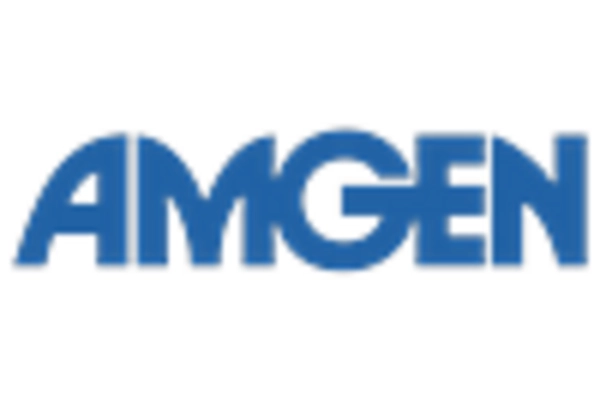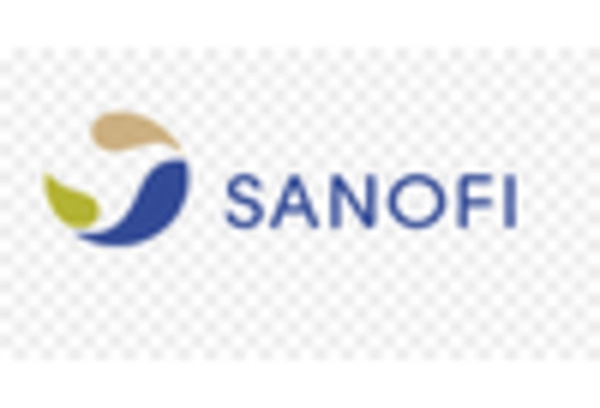Advancements in Treatment Modalities
Innovations in treatment modalities for atherosclerosis are significantly influencing the atherosclerosis market. The introduction of novel therapies, including biologics and advanced stent technologies, has transformed the management of atherosclerosis. For instance, the development of drug-eluting stents has shown to reduce restenosis rates, thereby enhancing patient outcomes. The UK healthcare system is increasingly adopting these advanced treatment options, which are often supported by clinical evidence demonstrating their efficacy. As a result, the market is likely to experience a surge in demand for these innovative solutions. Additionally, the integration of personalized medicine approaches, which tailor treatments based on individual patient profiles, is expected to further drive market growth. This shift towards more effective and targeted therapies may lead to improved patient adherence and satisfaction, ultimately benefiting the atherosclerosis market.
Growing Awareness and Education Initiatives
The rise in awareness and education initiatives regarding cardiovascular health is a crucial driver for the atherosclerosis market. Public health campaigns aimed at educating the population about the risks associated with atherosclerosis and the importance of early detection are gaining traction in the UK. These initiatives are often supported by healthcare organizations and government bodies, which recognize the need for proactive measures to combat cardiovascular diseases. As awareness increases, more individuals are likely to seek medical advice and screening, leading to higher demand for diagnostic tools and treatment options. Furthermore, educational programs targeting healthcare professionals are enhancing their ability to identify and manage atherosclerosis effectively. This growing emphasis on education is expected to contribute positively to the atherosclerosis market, as it fosters a more informed patient population and encourages timely interventions.
Regulatory Support for Innovative Therapies
Regulatory support for innovative therapies is emerging as a significant driver in the atherosclerosis market. The UK regulatory framework is increasingly facilitating the approval and market entry of new treatments and technologies aimed at managing atherosclerosis. Initiatives such as the Innovative Licensing and Access Pathway (ILAP) are designed to expedite the development and availability of groundbreaking therapies. This supportive environment encourages pharmaceutical companies and biotech firms to invest in research and development, potentially leading to a wider array of treatment options for patients. As new therapies receive regulatory approval, the atherosclerosis market is likely to expand, providing healthcare providers with more tools to combat this prevalent condition. The collaboration between regulatory bodies and industry stakeholders is crucial in fostering innovation and ensuring that patients have access to the latest advancements in atherosclerosis management.
Rising Prevalence of Cardiovascular Diseases
The increasing incidence of cardiovascular diseases in the UK is a primary driver for the atherosclerosis market. According to recent health statistics, cardiovascular diseases account for approximately 27% of all deaths in the UK, highlighting a critical public health issue. This alarming trend necessitates enhanced diagnostic and therapeutic solutions, thereby propelling the demand for atherosclerosis-related products and services. The atherosclerosis market is expected to witness substantial growth as healthcare providers focus on addressing this rising burden. Furthermore, the aging population, which is more susceptible to atherosclerosis, contributes to the growing patient pool. As a result, pharmaceutical companies and medical device manufacturers are likely to invest more in research and development to cater to this expanding market, ultimately improving patient outcomes and driving market growth.
Economic Factors Influencing Healthcare Spending
Economic factors play a pivotal role in shaping the atherosclerosis market. The allocation of healthcare spending in the UK is increasingly directed towards managing chronic diseases, including atherosclerosis. With the National Health Service (NHS) prioritizing cardiovascular health, funding for atherosclerosis-related treatments and interventions is expected to rise. This trend is further supported by the growing recognition of the economic burden associated with untreated atherosclerosis, which can lead to costly complications such as heart attacks and strokes. As healthcare budgets expand, there is likely to be increased investment in both preventive measures and advanced treatment options. Consequently, the atherosclerosis market may experience growth as healthcare providers seek to implement cost-effective strategies that improve patient outcomes while managing overall healthcare expenditures.
















